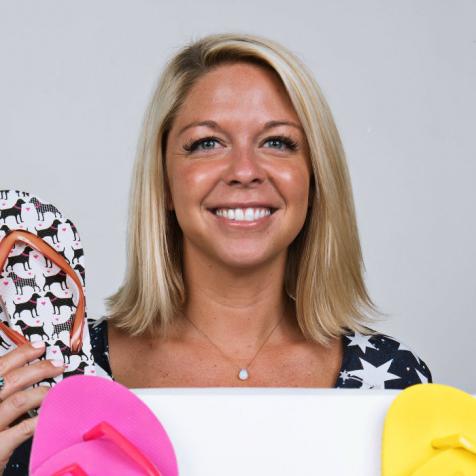
Company Details
Location
Denver, Colorado / San Jose, Costa Rica
Founded
2015
Ownership Type
Private
Employees
4
Products
Shoes, flip flops
Denver / San Jose, Costa Rica
Founded: 2015
Privately owned
Employees: 4
The amalgamation of flip-flop and feet, FLEEPS is founder and CEO Kael Robinson's clever solution to fashionable footwear, ethical manufacturing, and social justice.
Once you've adjusted the smooth ankle straps on your new FLEEPS, it'll feel like you're walking around barefoot. The ribbed cushion sole, though -- constructed from a shock-absorbing blend of PVC and EVA, a performance polymer used in active footwear -- is so effective consumers could run in their sandals.
"We don't actually recommend them for running," says Robinson, who cut her teeth at top design houses -- Vera Wang, Talbots -- before founding her inaugural fashion brands: Brazilets and Live Worldly, a travel-for-good company. It was Robinson's passions for travel, education, and fashion (plus one seriously durable pair of shoes!) that inspired the entrepreneur to add another business to her growing portfolio.
Two summers ago, Robinson was traversing Denver in a pair of fabric flip-flops she'd purchased a decade ago -- and collecting compliments on them everywhere she went. Robinson decided, "If one more person asks me about these shoes, I'm starting another company."

Sensing consumer demand, Robinson searched for a place to make her own version of the sleek and comfortable day-to-night sandals. Manufacturing in America would have been preferable; the machines needed for molding, though, were scarce. "We would have had to buy them outright, and they were too expensive," Robinson explains.
"I flew to China, met with manufacturers there, and decided I didn't want to work with China," continues Robinson, who picked up on some "major problems," she says, during preliminary sampling. Those samples, for example, were made from a recycled rubber blend, and testing showed glass and chemicals. "It wasn't good for the environment, or for the people wearing them," Robinson suspected. Beyond that, there were design flaws, and Robinson adds, "Things got lost in translation, the time change was an issue, and so was customs."
Three months later, Robinson was making FLEEPS in Costa Rica's capital city instead, at a decades-old, family-owned facility specializing in footwear.
"In Costa Rica, we're able to have a more hands-on approach," Robinson begins. Everything's made in assembly line format at a single site; the manufacturer also retains an in-house engineer who helped develop new technology specifically for FLEEPS.
"They employ about 100 people, mostly women," continues Robinson. There's a genuine, handmade feel to production; during the first FLEEPS run Robinson noticed the tissue paper holding her shoes had been hand-stamped.
"It's made with love," Robinson says, calling the manufacturer "more of a partner at this point." It's a symbiotic relationship Robinson nurtures from the FLEEPS headquarters in Denver.
Robinson visits the factory quarterly, and maintains an arm's length relationship via weekly conference calls. "When the women are invested, the outcome product is better," she notes.

Costa Rican FLEEPS employees are paid "above minimum wage," Robinson says, adding, "Through our production, we help fund community redevelopment." Robinson's company has also sent children of FLEEPS production line workers to school via its FLEEPS Foundation: Every time a pair of FLEEPS is purchased, 10 percent of the sale -- about $4 per pair -- is funneled into to the 501(c)(3), and funds are distributed to partner organizations SHOFCO and Starfish, providing educational opportunities to girls and young women worldwide.
FLEEPS began manufacturing in early 2015, with a 1,400-shoe run; the second production round was much larger, producing 14,000 pairs of vegan sandals made of rubber sourced locally in Costa Rica. The manufacturing process doesn't produce any carbon emissions, and Robinson says, "We reuse leftover rubber, so there is zero waste."
FLEEPS come in 14 colors: "the colors of the rainbow, plus silver and gold," Robinson says. In June 2016, the company launched a custom initiative allowing consumers to mix and match strap and sole colors for online orders, which account for the vast majority of FLEEPS sales.
Robinson hopes to move into brick-and-mortars soon by finding "one big retail partner," she says.
Challenges: Consumers! "They don't know how to wear our sandals; we're currently working through some videos," Robinson says. General product awareness has been another startup conundrum Robinson's tackling.
Opportunities: Enhancing the social impact aspect of FLEEPS. Robinson's goal is to sell 1 million pairs of her sandals by 2017, which would afford a kindergarten-through-college education to 10,000 girls via the FLEEPS Foundation.
Needs: "Getting ambassadors to represent our brand," says Robinson. In line with her challenges, Robinson sees a need for raising awareness about the product and, also, the mission behind it.
